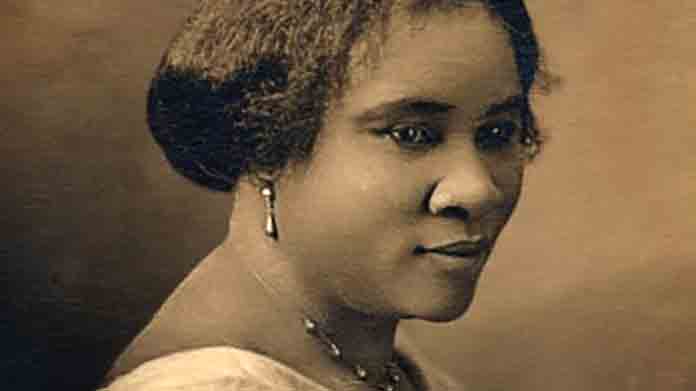Recognized today as “the first black woman millionaire in America,” Madam C. J. Walker holds an important place in the history of entrepreneurship. Throughout her life, she overcame numerous personal and institutional obstacles, becoming incredibly successful at a time when the odds were stacked against women of color.
Although society has evolved to become more welcoming to female entrepreneurs, many women in business still face biases similar to those Walker encountered. As a result, there’s a lot to be learned from the story of this inspirational woman, who never let anyone get in the way of her success and served as a pioneer for all future female entrepreneurs.
A Childhood Marked by Struggle
Madam C. J. Walker was born Sarah Breedlove on a plantation in Delta, Louisiana in December 1867. As the first in her family to be born after the Emancipation Proclamation, her childhood was marked by the fresh legacy of slavery. Both of her parents were Louisiana sharecroppers who had been born into slavery.
Sadly, Walker and her four siblings were orphaned when she was six years old. She thereafter worked in the cotton fields with her sister, Louvenia. The hardship did not end there. After marrying at 14, in part to escape an abusive brother-in-law, Walker became a widow at 20 years old. She was left as a single parent to her daughter, A’Lelia, in 1885.
Despite those recent tragedies, Walker had to carry on for her daughter and decided to find a way out of poverty. After her husband’s death, the two moved to St. Louis, Missouri, where she worked as a laundress during the day and attended school at night. Her ambition was evident, as was her commitment to the community through activity in the National Association of Colored Women and the St. Paul African Methodist Episcopal Church.
While working in St. Louis, Walker met Charles J. Walker, her future husband who inspired the name for the company she would soon create. She also began experimenting with her own formulas for strengthening hair.
Getting Down to Business
Walker's business journey began while selling hair products created by Annie Turnbo Malone, another African American businesswoman. In fact, Malone was also one of the first African American businesswomen to become a multi-millionaire, paving the way for future generations of women entrepreneurs. After working with Malone for a couple of years, Walker eventually decided to branch out and start her own business.
The idea for Walker’s company stemmed from a personal struggle with hair loss. After losing much of her own hair due to a scalp disorder, she was inspired to create hair care products for black women that put an emphasis on the health of customers. She took up a new name and devised a method — the “Walker system” — that involved scalp preparation, lotions, and iron combs which quickly gained popularity and blew any competition out of the water.
What started as a very small business — Walker making products at home and selling them directly to black women — grew exponentially from the initial pool of loyal customers and $1.25 used to get things off the ground.
The business really picked up speed after she moved to Denver, Colorado in 1905. With her husband helping with marketing, advertising, and mail orders, she ironed out an effective business plan in which saleswomen, dubbed “beauty culturalists,” worked on building a huge customer base for “Madam Walker’s Wonderful Hair Grower.”
One of the reasons Walker was such a great entrepreneur is because she never settled. Following a divorce from her husband, Walker expanded her empire to include a beauty school and a factory in Pittsburgh, Pennsylvania, which she named after her daughter.
According to a short biography of her life, “At the height of production, the Madame C. J., Walker Company employed over three thousand people, largely black women who sold Walker’s products door-to-door.” In the final year of her life, the company’s sales exceeded $500,000 with Walker’s own personal worth topping $1 million.
A Lasting Legacy
Walker’s reputation grew with her company. Soon, Madam C. J. Walker became a household name. However, it wasn’t just for the business acumen that she was so well-known. In addition to running her company, Walker was a major philanthropist. She was dogged in her support for social causes relating to women and African Americans, campaigning for black rights in America and the end of lynching.
Throughout her life, she made generous donations to educational causes and black charities, “funding scholarships for women at Tuskegee Institute and donating to the NAACP, the black YMCA, and dozens of other organizations that helped make black history,” according to History.com.
She also revolutionized the structure of businesses to empower women. In addition, she scoped and promoted female talent within her own company, which was very uncommon at that time. Britannica explained that “She continued to develop her business by traveling across the United States and providing career opportunities and economic independence for thousands of African American women who otherwise would have been consigned to jobs as maids, cooks, laundresses, and farmhands.” In fact, in the company’s charter, there is a clause that says only a woman can be its president.
Another initiative Walker started, which while normal today was completely trailblazing, was encouraging her employees to give back to the community. She established clubs at her company and would reward members who did charity work.
Walker passed away at the age of 51 because of hypertension. Though she died relatively young, her legacy has certainly lived on. Not everyone knows her name, but all women are better off because of the antiquated stereotypes Walker shattered through her entrepreneurship and philanthropy.
She proved women have business savvy, that they can successfully lead companies, and that female-dominated workplaces can be incredibly profitable.
Moreover, Walker exemplifies resilience, having overcome immense challenges during her childhood and even finding the silver lining of a disease that caused her to lose her hair. Against all odds, she prevailed — and made the world a better place along the way.



